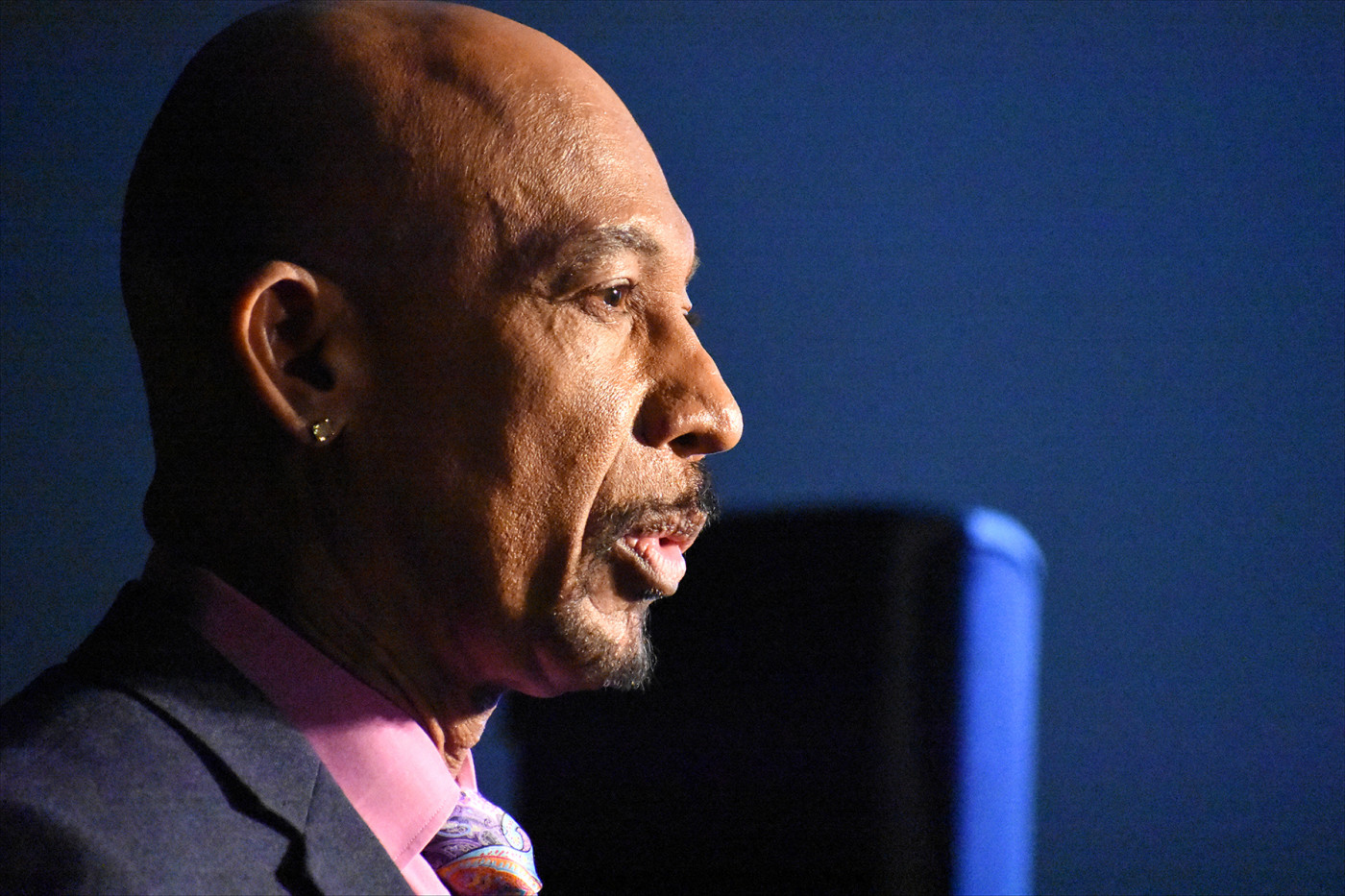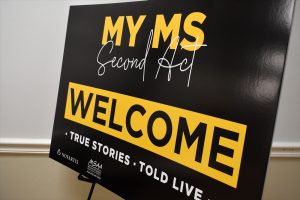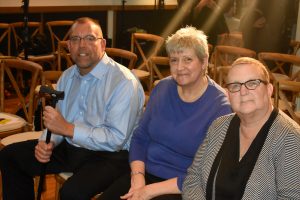TV Personality Montel Williams Launches ‘My MS: Second Act’
Written by |

TV personality Montel Williams speaks at the 2019 launch of My MS: Second Act. (Photo by Larry Luxner)
A little over 20 years ago, Montel Williams learned once and for all that he had multiple sclerosis (MS). But that determination should have happened long before then, said the well-known TV personality — who’s made fighting the neurodegenerative disease his life’s mission.
Williams, 63, was the star attraction at a New York event inaugurating “My MS: Second Act,” a joint effort co-sponsored by the Multiple Sclerosis Society of America (MSAA) and Novartis.

TV personality Montel Williams speaks at the launch of My MS: Second Act in New York. (Photos by Larry Luxner)
Also on hand were three MS patients who told their stories — Karen B., Mike O., and Faith A. — with coaching from The Moth, a New York-based nonprofit group.
“I don’t consider myself a patient. I’m a survivor,” said Williams, a former TV and radio talk-show host, actor, Naval officer, and now cannabis advocate, who in 2017 launched a line of marijuana products aimed at relieving the painful symptoms of MS.
But at this Oct. 23 gathering in New York, Williams wasn’t there to talk about cannabis.
“A lot of you know me because I was invited into your living room for 17 years on the Montel Williams Show,” he told an audience of about 100 people. “In 1980, while at the U.S. Naval Academy, I went blind in my left eye for seven months, which stopped me from graduating. I was one of the only graduates who threw his hat in the air but did not get commissioned.”
His vision later came back, but Williams was denied a chance in 1974 to pursue a degree in aviation because his eyesight had deteriorated. He ended up as an intelligence officer, “doing more sea time and combat than most of my peers did.”
“I continued my career, and over the course of the next 10 years while on active duty, every three or four months I would go back to the doctors because there was something wrong — usually a really weird feeling in my legs or feet,” he said. “They kept telling me to lose weight and that my back pain would go away.”
Ostracism, resentment, and shock
But Williams continued to decline, to the point where his feet felt like they were on fire.
“I went to see a doctor, and he told my ex-wife, ‘he looks like he has MS.’ That was on a Friday. On Saturday, he said to me, ‘you have MS.’ I had no idea what MS was. No one had ever used those words to me before.”

Sign welcomes guests to the Oct. 23, 2019, launch of My MS: Second Act.
“He handed me some literature and said, ‘We don’t usually see this in an African-American male, and it’s the category that does the worst. I expect you to be in a wheelchair in the next four years.’ This doctor had the nerve to tell me this,” he said. “I almost literally picked him up and threw him out of the room.”
From that day on, Williams decided to learn everything he could about the disease. Twenty years after his diagnosis, he’s learned how to cope and thrive with MS, rather than succumb.
“It doesn’t make me any more special, but it’s given me the opportunity to share with so many others who also suffer from MS,” he said. “Every time I was able to share my story, I got feedback from people who said it made a difference in their lives.”
Williams said he was ostracized to some extent following his diagnosis.
“It wasn’t like I had changed that much from before the diagnosis. But I also realized that by not being alone, by talking about it and sharing my experiences with others, I found people in similar circumstances,” he said.
“Every single one of us who has this disease suffers differently. It was so important to have my family stand with me and help me in those times when I felt my journey was about to end.”
Focusing on the SPMS journey
Asked why the initiative is called “My MS: Second Act,” Williams said it is a reference to secondary progressive multiple sclerosis (SPMS), which follows relapsing-remitting multiple sclerosis (RRMS) in about four out of five cases.
Leverne Marsh, vice-president and head of the U.S. neuroscience franchise at Novartis, elaborated.

TV personality Montel Williams poses with officials of Novartis and the MSAA.
“For patients with SPMS, it’s almost a second act for them, because they’ve gone from a relapsing to a progressive state of disease,” she said. “For us, it’s about education. This is an unbranded initiative; this is not a conversation about Novartis treatments.”
Marsh added: “Many MS patients already feel isolated, and specifically those who have progressive disease feel even more isolated. We want to help these patients with educational tools so they can recognize the symptoms of disease progression. The earlier they do that, the more empowered they are to have these conversations with their physicians.”
Mary Bailey, MD, is a neurologist at the Mandell Center for Comprehensive Multiple Sclerosis Care in Hartford, Connecticut. She said SPMS is not discussed enough and deserves more attention — and that the earlier patients seek highly effective treatment, the better their long-term prognosis will be.
“It’s a form of MS that 80% of people with RRMS will encounter at some stage,” Bailey said. “But that 80% figure can be reduced. The less disease burden you accrue early on, the fewer lesions you’ll have, and the less there is to progress to SPMS.
“When I talk to patients, I ask if they’re seeing signs of decline in their walking or thinking. It doesn’t have to be obvious — but if you notice subtle changes, you may have some signs of progression.”
Many disease-modifying treatments are now available, Bailey added, but “our obsession [is] with making sure we stay focused on the right treatment for the right patient. Over the next 20 years, with our new therapies, we are going to change the course of MS. It’s just a matter of getting patients on these therapies.”
Montel’s secret survival regime
Following his presentation, Williams spoke to Multiple Sclerosis News Today in an exclusive interview.
“MS is such an individual disease. You put 10 people with MS in a room, and six of them are on different medications — and four aren’t on any medication at all,” he said.

Mike O., Karen B. and Faith A. spoke of their MS experiences at the event co-sponsored by Novartis and the MSAA.
“I’m blessed by the fact that I’m on six different treatment regimens,” he added. “I’m on Western medication, and also on a holistic treatment protocol that includes changes in my diet, exercise, and mindfulness.
“Physically, I can run, but I don’t do that, though I do a considerable amount of walking every day — at least 20 to 30 minutes of it, as well as 20 to 30 minutes of elliptical training. I also work on balance exercises, TRX, and resistance training.”
Yet Williams refused to say how he changed his diet or what therapies he’s on, out of fear of unduly influencing or misleading other MS patients.
“About 10 years ago, I made the mistake of saying once in an interview that I was taking XYZ drug, and for about the next year, I had doctors tell me, ‘please don’t do that again, because what works for you isn’t necessarily what’s going to work for someone else.’ I know people who have taken two or three drugs before they found ‘the one.’ And those caused very serious, debilitating side effects.”
As for the immediate future, Williams said he would focus his efforts on ‘My MS: Second Act’ while continuing to advocate — in any way possible — for the estimated one million Americans with multiple sclerosis.
“I’ve had people walk up to me and say, ‘I wish my husband or wife would be like you.’ But I tell them, there’s no way, because the way this disease manifests itself is unique to every individual,” he said.
“The one thing we can all do is try to live down to other people’s expectations, but live up to our own — by truly understanding the definition of who we are.”


